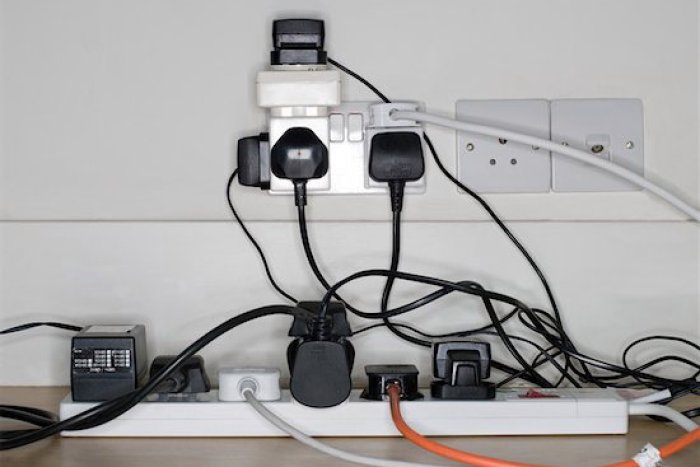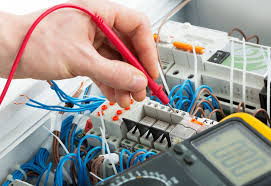Is it Time for an Electrical Wiring Upgrade in Your Home?
While it may seem like a permanent component of your house, residential electrical wiring often has a finite lifespan. If you’ve purchased an older home or lived in your present residence long enough, the time eventually arrives when re-wiring the house may be necessary. Some of the reasons are related to the age of the electrical system and/or its original configuration. Others are simply a result of the changing times and higher demand. Here are some scenarios that may cause you to consult a qualified electrician about upgrading your electrical wiring.
Does the house have aluminum wiring? Abut 2 million houses built in the late 1960s and early 1970s do. Connections in aluminum wiring are known to be at high risk for failure. This could cause a dangerous fire or, at the very least, interrupt power to household circuits. Replacement with copper electrical wiring is indicated.
Are circuit breakers tripping? That can be a symptom of a system that’s not up to the task of providing enough electricity to meet current demand. The rapidly increasing number of electrical devices in today’s homes has made the old standard 60- or 100-amp systems increasingly obsolete. Today, new houses are typically constructed with wiring and panels rated for at least 150 amps. (Circuit breakers that repeatedly trip may also indicate a faulty appliance or dangerous shorts, so they should always be checked out by a qualified electrician immediately.)

Safety Issues with Older Wiring
Faulty wiring is the leading cause of residential fires, according to a 2009 study by the National Fire Prevention Association. And the older your house is, the greater the chances that the wiring might be outdated or unsafe.
Old wiring—even knob and tube wiring that dates back to the early 20th century—isn’t inherently dangerous, but unless you were around when the house was built, you can’t be sure the electrical system is up to code. Plus, materials such as wire insulation can deteriorate over time.
If you don’t know when your wiring was last inspected, it’s worth paying a licensed electrician to give it a once-over, especially if you have any of these warning signs:
- Breakers that trip or fuses that blow repeatedly
- A tingling sensation when you touch an appliance
- Flickering or dimming lights
- A persistent burning smell from a room or appliance
- Warm, discolored, or sparking outlets
- Two-prong ungrounded outlets throughout the house
- No ground fault circuit interrupter (GFCI) outlets in kitchens, baths, and other areas exposed to moisture.
Another reason to consider upgrading is that some carriers refuse to insure houses with older wiring, or charge owners higher premiums

Signs You Need Electrical Updates
If you want to keep your home safe, you need to make sure your electrical panel is up to snuff.
You might be surprised to find how many common electrical issues can be traced back to a faulty electrical panel. Remember, your panel is linked to your entire electrical system, so if the panel is malfunctioning, the damage is more widespread than the basement or dining room.
Your Home Relies on Fuses and a Fuse Panel
Technically, there’s nothing wrong with fuses and fuse panels, per se. A fuse and a circuit breaker both protect an overloaded circuit by interrupting the flow of electricity, switching off the power before the circuit blows. The way they do it is very different. A fuse contains a piece of metal that melts when overheated, while a circuit breaker has an internal switch mechanism that cuts power when it senses an unsafe power surge. As we said, there’s nothing technically wrong with fuses and fuse panels. They’re common in older houses built before the 1960s. The problem is that, because it uses a melting piece of metal, they’re a major fire hazard.
Old or Faulty Wiring
If your electrical panel is up-to-date and your lights still dim and flicker, that’s a sign that your wires may be old. If you’re not sure whether your wires are old or faulty, there are a couple other red flags you can look for. A burning smell near electronics or appliances isn’t a ghost–it’s the scent of burning wiring. The same thing applies to a shock or tingling sensation when you touch an appliance. Sometimes it’s static electricity, but if it happens often, it’s probably not static. And if you see any discoloration near plugs, it’s time to switch off your power and call an electrician. Generally, if you live in an old house, it’s a good idea to get your wiring checked regularly–the house likely contains outdated wiring systems that may need to be replaced.

Your Circuit Breaker Often Trips
A circuit breaker should “trip” when it overloads—this is a safety feature that prevents hazards. But if your circuit breaker always trips, that’s a solid sign you need an electrical service upgrade. It means that the electrical panel can no longer handle your electricity requirements. This means you now have too many appliances that your breaker can handle. This forces the breaker to supply more electricity than its capacity. This can overheat its circuit, which can then fry up the circuits of all appliances connected to it.
Lights Keep Flickering or Usually Turns on and off
Do your house lights flicker when you power on your air conditioner? Perhaps they go on and off whenever you run any high-wattage appliance. Either way, this can mean that your electrical panel is already going beyond its capacity. This situation often precedes a constantly tripping circuit breaker. Upgrade the electrical panel now before it damages your appliances’ internal components.
The Electrical Panel Gets Warm or Emits a Burning Smell
The heat or burning smell can indicate severe overloading. These signs can also mean a failed circuit breaker or a disconnected wire. All these issues can trigger a house fire. Turn off the electrical panel as soon as you notice these signs. Then, have expert electrical service providers repair or replace your electrical panel.
Worn-Out Wiring
If the wiring in your building is more than 40 years old, chances are it won’t be able to meet your needs safely and efficiently, especially if it hasn’t been properly maintained.
Your electrical wiring could be unsafe if you notice:
- Your lights flicker or dim frequently, particularly when a large appliance such as a refrigerator or A/C kicks on.
- Equipment and appliances run slowly or can’t reach full power.
- Breakers trip or fuses blow repeatedly.
- You need extension cords to get power to all your equipment.
- Your switch plates and outlets feel warm.
- You feel a tingling when you touch a metal appliance. This means the appliance isn’t properly grounded and could cause electrocution.
- Outlets are brown or melted.
- Outlets spark or warm up when you plug something in.
- Parts of the insulation around your wiring has melted.
- You notice a burning or hot plastic smell in a certain room.
Some issues don’t pose an immediate threat, but should still be corrected to ensure the safety of your building’s occupants. Two-pronged, ungrounded outlets should ideally be replaced with three-pronged grounded outlets. If your kitchen, bathrooms, and other rooms with high moisture levels don’t have GFCI outlets, these should be installed. GFCI outlets have a “test” and “reset” button in the middle between the sockets. They can detect abnormal current flow, and prevent shorts and resulting electrical fires.